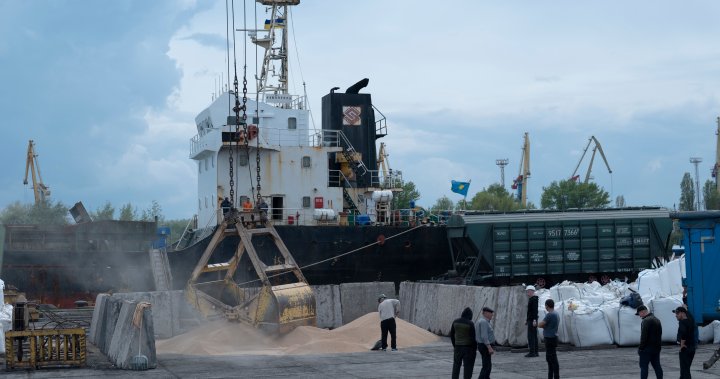Fears of a global food crisis loom as Black Sea grain deal nears deadline – National | Globalnews.ca
A precarious deal brokered last summer to help feed the world hangs in the balance over whether Russian President Vladimir Putin, the United Nations and the European Union can break a deadlock.
The Black Sea grain deal, which facilitates the use of Ukrainian ports for food grain shipments and the export of Russian food and fertilizers during the ongoing war, is set to expire on Monday.
The deal last year was a crucial breakthrough, brokered by Turkey and the United Nations, that allowed Ukraine to ship 32.8 million metric tons of grain. More than half this export went to developing nations around the world, and had been cut off during Russia’s invasion.
Ukraine and Russia are both major suppliers of food grains to many countries in Africa and western Asia and the invasion had initially raised fears of a global food crisis if that access was cut off. While the Black Sea deal managed to stave off the worst, those fears have now returned with the deadline looming Monday.
Putin said on Thursday that Russia could withdraw from the deal until other sides fulfil their promises. Moscow has repeatedly threatened to block its extension over aspects of its implementation affecting Russia’s own exports.
Putin, speaking on state television, said Russia was in contact with the United Nations on the matter but said he had not seen a message addressed to him from the UN secretary-general suggesting a compromise to salvage the deal.
He also wants concessions the EU has been hesitant to allow regarding the SWIFT international payment system and a Russian agricultural bank.

The lapsing of the deal would also mean that the World Food Program’s aid programs for at-risk countries, such as Ethiopia, Somalia and Afghanistan, would be threatened.
The pandemic has already pushed food-insecure people across the world to the brink.
The UN on Wednesday released its annual State of Food Security and Nutrition in the World report, which said that approximately 725 million people faced chronic hunger in 2022. This figure is up from 613 million in 2019.
The war in Ukraine has caused the UN to update its projections on world hunger.
“Updated projections show that almost 600 million people will be chronically undernourished in 2030 … this is about 119 million more undernourished people than in a scenario in which neither the pandemic nor the war in Ukraine had occurred, and around 23 million more than in a scenario in which the war had not happened,” the report said.
If the deal isn’t extended, “the countries that had relied on Ukraine for their imports are going to have to look at other sources for imports, very likely Russia, which is something that I imagine Russia was intending,” said Caitlin Welsh, director of the Global Food and Water Security Program at the Center for Strategic and International Studies.

Kremlin spokesperson Dmitry Peskov told reporters last week that “at the moment, unfortunately, we don’t see any particular grounds for extending this deal.”
Officials across the world are scrambling to save the deal ahead of Monday.
Stephane Dujarric, spokesperson for UN Secretary-General Antonio Guterres, said the UN chief sent a letter to Putin, asking him to extend the deal.
“The objective is to remove hurdles affecting financial transactions through the Russian Agricultural Bank, a major concern expressed by the Russian Federation and simultaneously allowed for the continuing flow of Ukrainian grain through the Black Sea,” Dujarric said at a press conference Wednesday.
Russian Foreign Minister Sergei Lavrov said on Thursday that he had not heard of any new proposals on the Black Sea grain deal. He added, however, that he had been working with Turkey to ensure Russian grain exports continued regardless of a deal.
A key demand by Moscow is the reconnection of the Russian agricultural bank Rosselkhozbank to the SWIFT international payment network. It was cut off by the European Union in June 2022 over Russia’s invasion of Ukraine.
An EU spokesperson said in May that the EU was not considering reinstating Russian banks.
However, Reuters reported that the EU is considering connecting a subsidiary of Rosselkhozbank to SWIFT to allow specifically for grain and fertilizer transactions.
“His (the secretary-general’s) overriding concern remains for vulnerable people around the world who stand to lose the most from any unravelling of the Istanbul arrangements and the likely subsequent rise in global food and fertilizer prices,” Dujarric said.
— with files from The Associated Press and Reuters
© 2023 Global News, a division of Corus Entertainment Inc.
For all the latest world News Click Here




